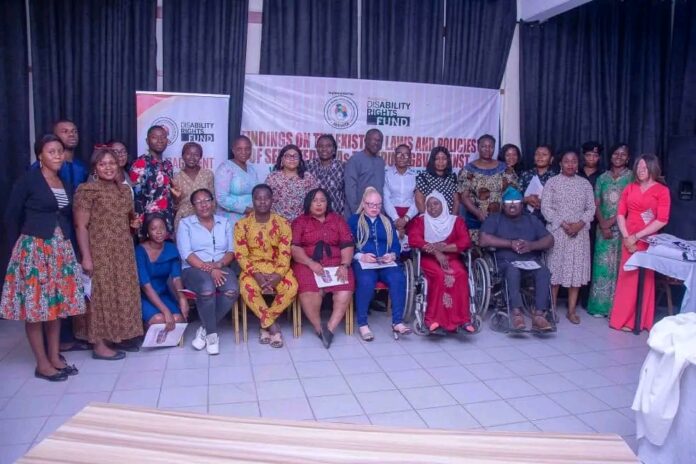Advocacy for Women with Disabilities Initiatives (AWWDI) has launched Findings on the existing policies and laws that will help to reduce Gender based violence (GBV) against women and girls with disabilities (WGWDs).
The findings which was launched on Tuesday in Abuja is supported by Disability Rights Fund (DRF).
The program officer, AWWDI, Kola Oledeyoba, in his opening remark said that as organization advocating for the rights of women and girls with disabilites, AWWDI has come to terms that for issues of women and girls with disabilites to be properly addressed, there should be policies on ground targeting women and girls with disabilites.
“A policy targeting Women and Girls With Disabilites will go a long way towards addressing several issues or challenges facing women with disabilites. Issues like Gender Based Violence, there is a lot of work on gender based violence for women but women and girls with disabilites have not been fully included and there is a lot of challenges arising from GBV against Women With Disabilites”.
“It has been a herculean task for women to report issues around Gender Based Violence, imagine how much difficult it is for women with disabilites”.
Speaking further, he alluded that when they even made effort to report, their report is not taken serious and their case in most times are treated with levity.
“The project would be looking at different laws and policies of MDAs who are saddled with the responsibility of providing GBV services to Women with Disabilities, so that we all would be well equipped with the requisite knowledge to approach the issue”
“It is also about reminding ourselves about our responsibilities in line with the existing laws and policies in order to redirect ourselves towards implementation to the benefit of women and girls with disabilites”.
He informed that the project will last for one year and the launch of the findings is marking the beginning. He informed the MDAs present that in the course of the project, they will be visiting them with the documents to evaluate how they are faring in the implementation of their laws and policies in relation to GBV services to Women with disabilities.
Bilikisu Yakubu, who represented the Executive Director, AWWDI, Patience Dickson while reading the Press Release for the launch of the document informed that Gender based violence and disability based violence, which includes physical, sexual and emotional abuse are the most common type of violence against women in Nigeria. One in five women between the ages of 15 and 49 has experienced physical violence.
“According to AWWDI coalition report in 2020 (published), this rate of incidence has risen during and after the Covid-19 pandemic”.
In spite of this, she said that Nigeria government through many MDAs has made significant efforts to combat gender-based violence (GBV) and disability based violence through her National Commission for Persons with Disabilities (NCPWD).
“Nevertheless many MDAs that are saddled with responsibilities of protecting WGWDs have no specific policies or mandate to help them carry out this role effectively”.
Speaking further she said that it is in view of this that AWWDI with the support from DRF reviewed all the MDAs policies in line with the role to safeguard Women and Girls with disabilities.
She informed that through the findings, it was discovered that some of the MDAs have gender policies or framework in place which speaks to the issue of women but there is no specific gender policy for women and girls with disabilities.
“The findings also show some challenges that we feel should be addressed, such as the lack of knowledge on victim-centered responses to GBV against women with disabilities and other available support services”.
“We are pleased to contribute to the issues around GBV against WGWDs by means of this presentation of findings and public information campaign about the outcome”.
She also said that it is the solutions towards addressing these key barriers that prompted AWWDI, with support from Disability Right Fund to launch these findings (including in policy review and implementation of disability inclusive and development activities) of MDAs and other stakeholders, aiming both at strengthening existing policies, creating new framework and informing the public of available services to tackle GBV-related to WGWDs.
She called on everyone particularly the media to join them in disseminating these findings through their various platforms.
She went further to state that AWWDI and DRF’s concern is about the harmful consequences of GBV around the community of women and girls with disabilities which they are aiming to sensitize the public which includes the overall disability community about this tool and policies that protect them.
“GBV and disability based violence does not only affect the victims, but it also damages the social fabric of the community.
While appreciating their supporting partner Disability Rights Fund for giving them the opportunity to implement the project and the MDAs for making the process easy, she
urged all stakeholders to make inputs in ensuring that the issues of persons with disabilities particularly women and girls with disabilities are geared towards mainstreaming disability into programs and activities.
“We call on everyone especially MDAs to continue to advocate and recognize the need to reference women with disabilites and or mainstream their issues around gender based violence into their policies, and also to carefully examine or review their policies and mandate to includes protection mechanism for women and girls with disabilities”.
Some of the MDAs present were Ministry of Health, National Commission for Persons With Disabilites (NCPWD), National Human Rights Commission (NHRC), National Agency for the Prohibition of Trafficking in Persons (NAPTIP), Nigerian Police Force and Legal AId Council.
Some Civil Society Organization like JONAPWD, Deaf Women Aloud Initiative, Hope Alive Possibilities Initiative, WRAPA, Inclusive Friends Association (IFA), HalyHope Foundation among others and Media organization like TVC, The Qualitative Magazine TQM were also present at the launch.


